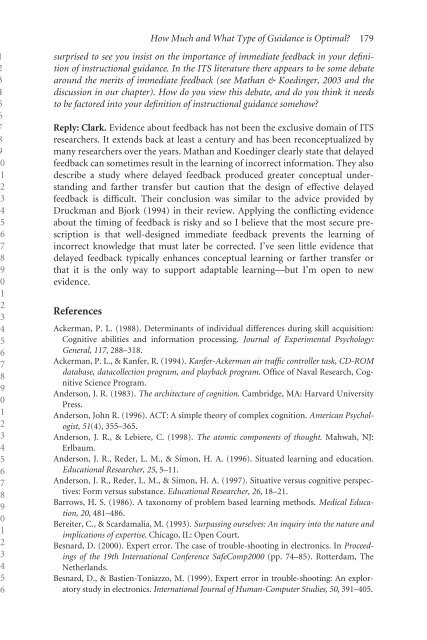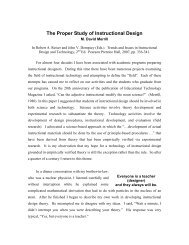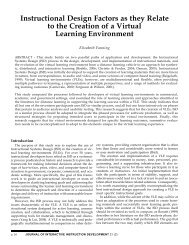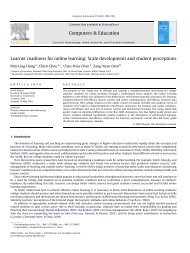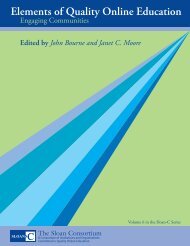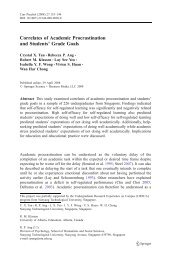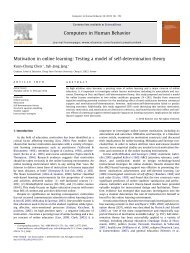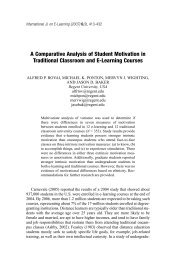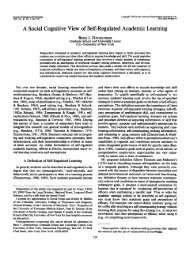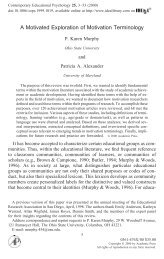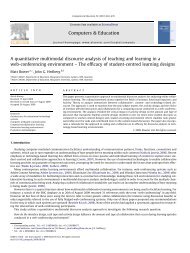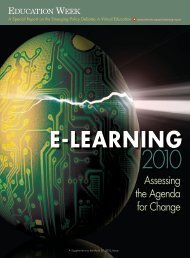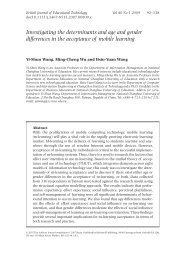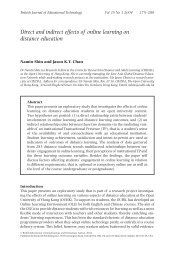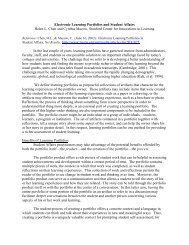<strong>How</strong> <strong>Much</strong> <strong>and</strong> <strong>What</strong> <strong>Type</strong> <strong>of</strong> <strong>Guidance</strong> <strong>is</strong> <strong>Optimal</strong>? 179surpr<strong>is</strong>ed to see you ins<strong>is</strong>t on the importance <strong>of</strong> immediate feedback in your definition<strong>of</strong> instructional guidance. In the ITS literature there appears to be some debatearound the merits <strong>of</strong> immediate feedback (see Mathan & Koedinger, 2003 <strong>and</strong> thed<strong>is</strong>cussion in our chapter). <strong>How</strong> do you view th<strong>is</strong> debate, <strong>and</strong> do you think it needsto be factored into your definition <strong>of</strong> instructional guidance somehow?0123456789012345678901234567890123456Reply: Clark. Evidence about feedback has not been the exclusive domain <strong>of</strong> ITSresearchers. It extends back at least a century <strong>and</strong> has been reconceptualized bymany researchers over the years. Mathan <strong>and</strong> Koedinger clearly state that delayedfeedback can sometimes result in the learning <strong>of</strong> incorrect in<strong>for</strong>mation. They alsodescribe a study where delayed feedback produced greater conceptual underst<strong>and</strong>ing<strong>and</strong> farther transfer but caution that the design <strong>of</strong> effective delayedfeedback <strong>is</strong> difficult. Their conclusion was similar to the advice provided byDruckman <strong>and</strong> Bjork (1994) in their review. Applying the conflicting evidenceabout the timing <strong>of</strong> feedback <strong>is</strong> r<strong>is</strong>ky <strong>and</strong> so I believe that the most secure prescription<strong>is</strong> that well- designed immediate feedback prevents the learning <strong>of</strong>incorrect knowledge that must later be corrected. I’ve seen little evidence thatdelayed feedback typically enhances conceptual learning or farther transfer orthat it <strong>is</strong> the only way to support adaptable learning—but I’m open to newevidence.ReferencesAckerman, P. L. (1988). Determinants <strong>of</strong> individual differences during skill acqu<strong>is</strong>ition:Cognitive abilities <strong>and</strong> in<strong>for</strong>mation processing. Journal <strong>of</strong> Experimental Psychology:General, 117, 288–318.Ackerman, P. L., & Kanfer, R. (1994). Kanfer- Ackerman air traffic controller task, CD- ROMdatabase, datacollection program, <strong>and</strong> playback program. Office <strong>of</strong> Naval Research, CognitiveScience Program.Anderson, J. R. (1983). The architecture <strong>of</strong> cognition. Cambridge, MA: Harvard UniversityPress.Anderson, John R. (1996). ACT: A simple theory <strong>of</strong> complex cognition. American Psycholog<strong>is</strong>t,51(4), 355–365.Anderson, J. R., & Lebiere, C. (1998). The atomic components <strong>of</strong> thought. Mahwah, NJ:Erlbaum.Anderson, J. R., Reder, L. M., & Simon, H. A. (1996). Situated learning <strong>and</strong> education.Educational Researcher, 25, 5–11.Anderson, J. R., Reder, L. M., & Simon, H. A. (1997). Situative versus cognitive perspectives:Form versus substance. Educational Researcher, 26, 18–21.Barrows, H. S. (1986). A taxonomy <strong>of</strong> problem based learning methods. Medical Education,20, 481–486.Bereiter, C., & Scardamalia, M. (1993). Surpassing ourselves: An inquiry into the nature <strong>and</strong>implications <strong>of</strong> expert<strong>is</strong>e. Chicago, IL: Open Court.Besnard, D. (2000). Expert error. The case <strong>of</strong> trouble- shooting in electronics. In Proceedings<strong>of</strong> the 19th International Conference SafeComp2000 (pp. 74–85). Rotterdam, TheNetherl<strong>and</strong>s.Besnard, D., & Bastien- Toniazzo, M. (1999). Expert error in trouble- shooting: An exploratorystudy in electronics. International Journal <strong>of</strong> Human- Computer Studies, 50, 391–405.
180 R. E. ClarkBrown, J. S., Collins, A., & Duguid, P. (1989). Situated cognition <strong>and</strong> the culture <strong>of</strong> learning.Educational Researcher, 18(l), 32–42.Brown, J. S., & Duguid, P. (1991). Organizational learning <strong>and</strong> communities <strong>of</strong> practice:Toward a unified view <strong>of</strong> working, learning <strong>and</strong> innovation. Organizational Science,2(1), 40–57.Chao, C.-J., & Salvendy, G. (1994). Percentage <strong>of</strong> procedural knowledge acquired as afunction <strong>of</strong> the number <strong>of</strong> experts from whom knowledge <strong>is</strong> acquired <strong>for</strong> diagnos<strong>is</strong>,debugging <strong>and</strong> interpretation tasks. International Journal <strong>of</strong> Human- Computer Interaction,6, 221–233.Clark, R. E. (1982). Antagon<strong>is</strong>m between achievement <strong>and</strong> enjoyment in ATI studies.Educational Psycholog<strong>is</strong>t, 17(2), 132–148.Clark, R. E. (1989). When teaching kills learning: Research on mathematics. In H. M<strong>and</strong>l,E. De Corte, N. Bennett, & H. F. Friedrich (Eds.), <strong>Learning</strong> <strong>and</strong> instruction. Europeanresearch in an international context (Vol. 2 & 3, pp. 1–22). Ox<strong>for</strong>d: Pergamon.Clark, R. E. (2001). <strong>Learning</strong> from media: arguments, analys<strong>is</strong> <strong>and</strong> evidence. Greenwich,CT: In<strong>for</strong>mation Age Publ<strong>is</strong>hing.Clark, R. E., & Blake, S. (1997). Analyzing cognitive structures <strong>and</strong> processes to deriveinstructional methods <strong>for</strong> the transfer <strong>of</strong> problem solving expert<strong>is</strong>e. In S. Dijkstra & N.M. Seel (Eds.), Instructional design perspectives. Volume II, Solving instructional designproblems (pp. 183–214). Ox<strong>for</strong>d: Pergamon.Clark, R. E., & Elen, J. (2006). When less <strong>is</strong> more: research <strong>and</strong> theory insights about instruction<strong>for</strong> complex learning. In J. Elen & R. Clark (Eds.), H<strong>and</strong>ling complexity in learningenvironments: Research <strong>and</strong> theory (pp. 283–297). Ox<strong>for</strong>d: Elsevier Science Limited.Clark, R. E., & Estes, F. (1996). Cognitive task analys<strong>is</strong>, International Journal <strong>of</strong> EducationalResearch, 25, 403–417.Clark, R. E., Feldon, D., van Merriënboer, J., Yates, K., & Early, S. (2007). Cognitive taskanalys<strong>is</strong>. In J. M. Spector, M. D. Merrill, J. J. G. van Merriënboer, & M. P. Dr<strong>is</strong>coll(Eds.), H<strong>and</strong>book <strong>of</strong> research on educational communications <strong>and</strong> technology (3rd ed., pp.577–593). Mahwah, NJ: Lawrence Erlbaum Associates.Cohen, H. S., Bloomberg, J. J., & Mulavara, A. P. (2005). Obstacle avoidance in novelv<strong>is</strong>ual environments improved by variable practice training. Perceptual <strong>and</strong> Motor Skills,101(3), 853–861.Cowen, N. (2001). The magical number 4 in short term memory: A reconsideration <strong>of</strong>mental storage capacity. Behavioral <strong>and</strong> Brain Sciences, 24, 87–114.Cronbach, L. J., & Snow, R. E. (1977). Aptitudes <strong>and</strong> instructional methods. New York:Irvington.De Corte, E. (2003). Transfer as the productive use <strong>of</strong> acquired knowledge, skills, <strong>and</strong>motivations. Current Directions in Psychological Science, 12(4), 143–146.DeLeeuw, K. E., & Mayer, R. E. (2008). A compar<strong>is</strong>on <strong>of</strong> three measures <strong>of</strong> cognitive load:Evidence <strong>for</strong> separable measures <strong>of</strong> intrinsic, extraneous <strong>and</strong> germane load. Journal <strong>of</strong>Educational Psychology, 100(1), 223–234.Druckman, D., & Bjork, R. A. (1994). <strong>Learning</strong>, remembering <strong>and</strong> believing. WashingtonDC: National Academy Press.Druckman, D., & Swets, J. A. (Eds.). (1988). Enhancing human per<strong>for</strong>mance: Issues, theories<strong>and</strong> techniques. Washington, DC: National Academy Press.Duffy, T. M., & Jonassen, D. H. (Eds.). (1992). Constructiv<strong>is</strong>m <strong>and</strong> the technology <strong>of</strong>instruction, a conversation. Mahwah, NJ: Lawrence Erlbaum Associates.Feldon, D. F. (2004). Inaccuracies in expert self- report: Errors in the description <strong>of</strong> strategies<strong>for</strong> designing psychology experiments. Unpubl<strong>is</strong>hed doctoral d<strong>is</strong>sertation, Rossier School<strong>of</strong> Education, University <strong>of</strong> Southern Cali<strong>for</strong>nia, USA.1234567891111111111222222222233333333334444444


